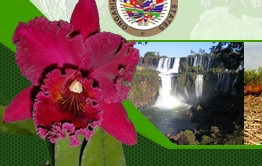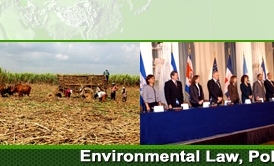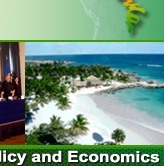|
|
|
|
|
|
|
|
||
|
|
|
||
 |
 |
 |
|
|
|
|
||
|
|
|
|
|
|
|
|
||
|
|
|
||
 |
 |
 |
|
|
|
|
||
|
|
|
Colombia The assessment for Colombia is being conducted with Instituto Colombiano de Derecho Ambiental. The economic sectors that were chosen and are being analyzed are confections and meat. The first draft of this assessment is currently being peer reviewed. Ecuador The assessment for Colombia is being conducted with Centro Ecuatoriano de Derecho Ambiental. The economic sectors that were chosen are tuna and African palm. The first draft of this assessment is currently being peer reviewed Peru The assessment for Peru is being conducted with Sociedad Peruana de Derecho Ambiental. The economic sectors that were chosen and are being analyzed are textiles and tropical wood. The first draft of this assessment is currently being peer reviewed Take me to the top
Dominican Republic The assessment for Dominican Republic is being conducted with Instituto Dominicano de Derecho Ambiental. The economic sectors are currently being selected and a preliminary outline has been finalized. Trinidad and Tobago The assessment for Trinidad and Tobago is being conducted with the Business Development Company. The economic sectors that have been selected are manufacturing and beverage. The first draft is currently being reviewed.
Costa Rica In the assessment conducted for Costa Rica and Guatemala sugar cane and melon were selected for the analysis, because of the importance of the agricultural sector for Central American economies. The assessment shows that during 2001, melon exports in both countries increased by $118 million dollars, expanding the cultivated area in the region to almost twenty thousand hectares. In the particular case of sugar cane, the analysis shows how both countries already have preferences with the United States, one of the main destination markets, through the Caribbean Basin Initiative and how they could be consolidated with an annual 2% increase in the quota if the DR-CAFTA agreement is implemented. Some of the key environmental issues analyzed in the assessment include the intensive use of water and its contamination from agriculture, in addition to effects of plastic disposal practices and pesticide use in melon production. Pollution from “slash and burn” in sugar cane plantations and some externalities related to soil and water were also covered. This assessment includes policy recommendations that have already been discussed with different stakeholders in the region. Guatemala In the assessment conducted for Costa Rica and Guatemala sugar cane and melon were selected for the analysis, because of the importance of the agricultural sector for Central American economies. The assessment shows that during 2001, melon exports in both countries increased by $118 million dollars, expanding the cultivated area in the region to almost twenty thousand hectares. In the particular case of sugar cane, the analysis shows how both countries already have preferences with the United States, one of the main destination markets, through the Caribbean Basin Initiative and how they could be consolidated with an annual 2% increase in the quota if the DR-CAFTA agreement is implemented. Some of the key environmental issues analyzed in the assessment include the intensive use of water and its contamination from agriculture, in addition to effects of plastic disposal practices and pesticide use in melon production. Pollution from “slash and burn” in sugar cane plantations and some externalities related to soil and water were also covered. This assessment includes policy recommendations that have already been discussed with different stakeholders in the region. El Salvador The OAS/DSD is undertaking a scoping exercise of lessons– learned and capacity building needs in the area of trade and environment for El Salvador, Honduras and Nicaragua. The required information for this component was obtained mainly through a survey that was completed by stakeholders at the national level from different sectors including private, governmental and non governmental (NGO’s). The draft of this exercise is currently being peer reviewed. Honduras The OAS/DSD is undertaking a scoping exercise of lessons– learned and capacity building needs in the area of trade and environment for El Salvador, Honduras and Nicaragua. The required information for this component was obtained mainly through a survey that was completed by stakeholders at the national level from different sectors including private, governmental and non governmental (NGO’s). The draft of this exercise is currently being peer reviewed. Nicaragua The OAS/DSD is undertaking a scoping exercise of lessons– learned and capacity building needs in the area of trade and environment for El Salvador, Honduras and Nicaragua. The required information for this component was obtained mainly through a survey that was completed by stakeholders at the national level from different sectors including private, governmental and non governmental (NGO’s). The draft of this exercise is currently being peer reviewed.
Argentina The assessment for Argentina was conducted with Fundacion Ambiente y Recursos Naturales (www.farn.org.ar) and it aimed to study the possible economic effects of the proposed Free Trade Area of the Americas (FTAA). This assessment looks at some of the key environmental issues in identified sensible sectors such as the meat industry, oil and its derivates, sugar processing, soy production, iron and steel making, and non-metallic mining the mentioned sectors. It also highlights the need for an in-depth life cycle analysis, in particular for the soy sector, given the high demand, growth of the activity and the nature of the social and environmental effects of its production. One of the conclusions of this assessment is the need for a formal communication mechanism between policy makers in different sectors, towards the integration of sustainability into trade and public policy overall. Click here to see complete publication. Brazil In Brazil, the assessment focused on the industrial sector and indicated that the main environmental changes with the possible implementation of FTAA could include water contamination and detriment in air quality due to outdoor air pollution. However, the assessment highlights that those industries that could affect air quality in Brazil use environmentally friendly technologies in order to meet sustainability and market access requirements of the export markets. Additionally, this assessment examines the Brazilian legal-institutional frameworks and the internalization of environmental cost by industry, concluding that these costs do not affect competitiveness. Finally, this assessment includes some recommendations for regulating entities in terms of promoting efficiency and competitiveness of the Brazilian industrial sector. Paraguay The sectors analyzed in the assessment for Paraguay, were soy and cotton, the later being slightly replaced by soy production that has practically become a monoculture of in Paraguay. The economic impacts of the fast growth in soy production with free trade were analyzed in the assessment, as well as the environmental and social effects, including, soil erosion, loss of biodiversity and jobs, due to the mechanic nature of soy production and spread of some diseases that had been previously eradicated. This assessment includes key policy recommendations for agricultural diversification and integration of sustainability into public policy and decision making. Uruguay The outcomes of the assessment conducted in Uruguay, highlight that the meat and wool sectors could have economic opportunities with trade liberalization. Paper and rice show slightly negative economic impacts in the analysis. The environmental effects derived from changes in the sectors with economic opportunities were not considerable, because of existing controls applicable for example to the meat industry. However, the assessment indicates that in the forestry sector there are serious impacts due to the cultivation of non native species and soil erosion. Another issue considered, is a notable tendency of increasing production of soy to meet international demand. This is also causing expansion of the agricultural frontier and additional pressure on soil due to replacement of native forest for agricultural purposes. Coordination within MERCOSUR for sustainable development policies and a common agricultural policy, are some of the recommendations of this assessment.
|
©
2005 Office for Sustainable Development and Environment -
Organization of American States. All
Rights Reserved. |